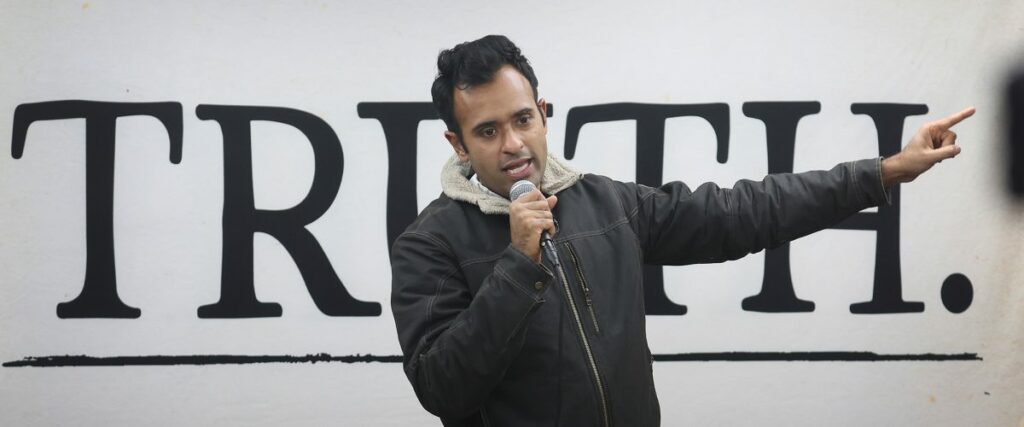As Jeanie and I danced the night away in Atlanta on New Year’s Eve — yes, we actually did that, although I admit I ended up with a twisted knee, a sadly predictable outcome for a man of my rapidly advancing years — I was aware that the spirit of revelry in the room was not unequivocal.
Yes, it is indeed momentous to see in a new year. Smiles, frivolity and bubbles are appropriate to the occasion. But we are greeting 2024 — another presidential election year. (Already? Really?) An election year in a deeply divided country. With Donald J. Trump dominating the headlines and the GOP polls once again, delighting his fans and horrifying his most ardent foes.
We are in a time of national crisis. Our social, political and epistemological divisions are bad and getting worse. Our declining trust in one another and in our core political and cultural institutions bodes very poorly for what will happen in 2024. We don’t agree on what is real, let alone what should be done about what is real. How do you solve problems in a context like that?
“We don’t agree on what is real, let alone what should be done about what is real.”
All of us writer types could spend the whole year wringing our hands about the perfidy of those bad folks on the other side. I noticed in looking at the year-end roundup articles on various opinion and analysis sites — including this one — how much of what we wrote about in 2024 was our national political crisis and the awfulness of the people and organizations we oppose. On right-leaning sites, the awfulness is all on the left. On left-leaning sites, the awfulness is all on the right.
After a while, it becomes almost boring — to me, at least — to contemplate reading or writing yet another article about how awful those other folks are. One could ask ChatGPT to write an essay describing everything that is wrong with (those bad people over there) and it would not be much different from what many of us are writing on an average day. How many ways are there to say the same thing?
Surely, I will feel compelled to write some such articles this year. But we are facing a national cultural, moral and even spiritual crisis that goes beyond the political. It seems that even Christian commentators — left and right — only seem to be able to talk these days in a political register, with a culture-war approach predominating. But culture matters too, in its deep currents, not just its political disputes. Culture represents the spirit, character, values, behavior and social institutions of a people. We need to be able to talk about what is happening to us as a people, not just how it is manifesting in our toxic politics.
Thus, I plan to write some articles this year about cultural issues and institutions. Let me name three that come to mind immediately.
We need to look at the health of the Church/the churches. In a time of national crisis — yes, especially if Donald Trump becomes president again and fulfills our worst fears by weakening democratic checks and balances — the churches will need to step up to meet the moment.
“Even if we don’t have a democracy in five years, we will still have churches here.”
Even if we don’t have a democracy in five years, we will still have churches here. But — spoiler alert — I believe this moment finds the churches and their leaders poorly prepared to meet such a challenge. I will unpack why I believe that in some future columns.
Then there is higher education. The forced resignation of the presidents of both Penn and Harvard in the last month tells us something, but what? Certainly, there is a great deal of mistrust of academic elites and the whole higher education sector on the part of many conservatives.
Is this fair? What is going on — or going wrong — in higher education? If Donald Trump is elected president again, we can expect sustained attacks on universities, their leaders and faculty from the White House. Will we academics be ready to offer good reasons for why we do what we do?
Finally, there is social media. I gave myself a gift on New Year’s Eve — after 15 years, I abandoned the Website Formerly Known as Twitter. While I had long been concerned about negative effects and personal risks of being engaged on that site, Elon Musk’s tenure as owner turned my concerns into a matter of some moral urgency.
Then, when I saw near New Year’s Eve that the gifted spiritual writer Anne Lamott was the most recent figure to stir up a hornet’s nest on X — in relation to an ill-considered tweet she threw out there about Taylor Swift — I thought to myself, what in the world are we doing here? Don’t we have better things to do?
The story of what is wrong with our culture circa 2024 cannot be told without considering what social media has done to our spirits and our minds, our way of being in the world and communicating with others.
We are in a crisis of culture, with a visible loss of moral wisdom, of spiritual moorings, of religious transcendence. We need to talk about this, and not just about how awful our enemies are and how much we wish them to disappear.
Are we ready for those conversations?
This article first appeared on Baptist News Global.

